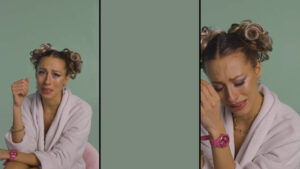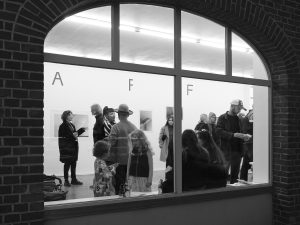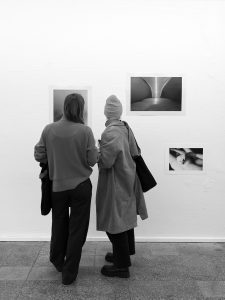
#GetReadyWithMe
Eröffnung
18:00 UHR
Künstler*innen
- Klara Kirsch
- Victoria Pidust
- Sarah Straßmann
- _
Eine Ausstellung über digitale Bildwelten, Rituale und Selbstinszenierung
Digitale Bilder sind aus unserem Alltag nicht mehr wegzudenken. Sie durchdringen nahezu alle Lebensbereiche – von der schnellen Google-Recherche über das Scrollen durch Instagram- oder TikTok-Feeds bis hin zur beiläufigen Kommunikation im WhatsApp-Gruppenchat, dem Erstellen eines Screenshots zur persönlichen Erinnerung oder den unendlichen Fotoaufnahmen mit unseren Handys. Wir agieren als sogenannte „Prosumer“ – als gleichzeitig Produzierende und Konsumierende digitaler Bildwelten. Scrollen, liken, sharen, snappen, skippen, tippen, löschen... diese Gesten gehören längst zu unseren unbewussten, sich ständig wiederholenden Alltagspraktiken.
Wir handeln mit Bildern – und diese entwickeln eine eigene Handlungsmacht: Sie formen soziale Gefüge, strukturieren menschliche Beziehungen, beeinflussen die Kommunikation zwischen Mensch und Maschine und prägen unsere Wahrnehmung. Digitale Bilder, ihre Ästhetiken, Gebrauchsweisen und Wiederholungsstrukturen konstruieren unsere Realität.
Ein prägnantes Beispiel für solche Bildpraktiken ist das Format #GetReadyWithMe (#GRWM), das der Ausstellung ihren Titel gibt. Das weit verbreitete Hashtag steht für eine Form alltäglicher Selbstdarstellung, die sich durch hohe Wiedererkennbarkeit und standardisierte Abläufe auszeichnet. Die Inhalte folgen oft ähnlichen Mustern und erzeugen so visuelle Rituale, die über die ästhetische Oberfläche hinaus als sozialer und kultureller Code wirken.
Diese visuellen digitalen Rituale bilden auch den Ausgangspunkt für die künstlerischen Positionen in der Ausstellung. In ihrer 3-Kanal-Videoinstallation „I WILL NEVER LET YOU DOWN AGAIN!“ (2022) untersucht Klara Kirsch die visuelle Dramaturgie öffentlicher Entschuldigungs-Clips von Influencer:innen in sozialen Medien. Wiederkehrende Gesten, Tonlagen und Bildkompositionen dieser Formate werden offengelegt und damit auch die Austauschbarkeit ihrer Aussagen. Sarah Straßmann widmet sich in ihrer Arbeit „How to become fucking average“ (2023) dem alltäglichen Einsatz von Foto-Filtern. Die Arbeit reflektiert die visuelle Normierung und Selbstdarstellung in digitalen Medien. Die Serie „iPhone Zooms“ (2021) von Victoria Pidust transformiert vermeintlich banale Alltagsmomente aus dem privaten Smartphone-Archiv durch gezielt gewählte Bildausschnitte. Die mit dem iPhone aufgenommenen Detailansichten lassen skulpturale, abstrakte Bildwelten entstehen, die sowohl fotografisch als auch malerisch anmuten.
#GetReadyWithMe versammelt künstlerische Positionen, die digitale Bildpraktiken nicht nur dokumentieren, sondern kritisch befragen, rekontextualisieren und ästhetisch transformieren. Die Ausstellung lädt dazu ein, alltägliche visuelle Rituale neu zu sehen – als Ausdruck einer kollektiven Kultur der Selbstinszenierung und des Bildhandelns im Digitalen.
Eine Ausstellung mit Arbeiten von Klara Kirsch, Victoria Pidust und Sarah Straßmann. Kuratiert von Julia Brigasky, Friederike Eden, Jule Fechner, Sarah Straßmann.
Credits: Klara Kirsch: „I WILL NEVER LET YOU DOWN AGAIN!“, 2022, Full HD Video, 5:58 min, 3-Kanal Videoinstallation
Besuch
Adresse
AFF Galerie e.V.
Kochhannstraße 14
10249 Berlin
Öffnungszeiten
Während der Ausstellung
Samstag und Sonntag 15 – 18 Uhr
und nach Vereinbarung
Anfahrt
M5, M6, M8, M10
Landsberger Allee / Petersburger Straße
S41, S42, S8, S85, S9
Landsberger Allee
U5
Frankfurter Tor
Verein


Mitglieder
-
Julia Autz
-
Julia Brigasky
-
Philipp Czampiel
-
Sven Gatter
-
Florian Grosse
-
Dana Rabea Jäger
-
Maidje Meergans
-
Natascha Pohlmann
-
Saskia Reis
-
Indra Schwarz
-
Sarah Straßmann
-
Matthias Walendy
-
Franca Wohlt
Medienpartner
-
PIB – PHOTOGRAPHY IN BERLIN


